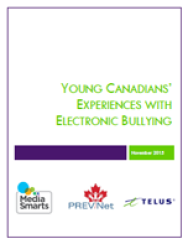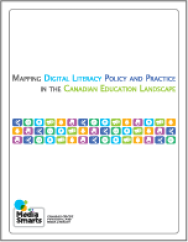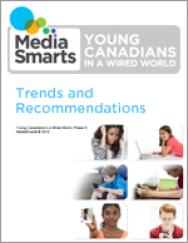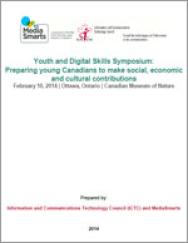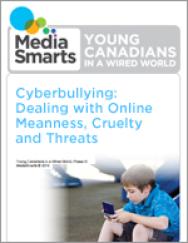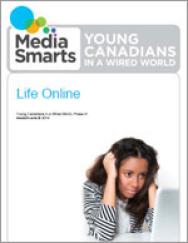Young Canadians’ Experiences with Electronic Bullying
Although there has been research on offline bullying and the role of peers, there is limited research on peer intervention for online bullying. Researchers have expressed concerns that cyberbullying and online harassment might increase negative bystander behaviours because of the physical distance and the perceived anonymity of online communication. To better understand the relationship between peer intervention and electronic bullying amongst Canadian youth, MediaSmarts partnered with PREVNet and TELUS to examine the factors that influence the likelihood of young people intervening in online bullying scenarios; the helpfulness of different ways of intervening, and the motivation and barriers to intervening.
Mapping Digital Literacy Policy and Practice in the Canadian Education Landscape
To develop the Use, Understand & Create framework, we needed to first explore the digital literacy skills Canadian youth were already learning in different provinces and territories. Our discussion paper Mapping Digital Literacy Policy and Practice in the Canadian Landscape draws on policy and curriculum documents from across the country to synthesize key concepts and best practices in current digital literacy education. The discussion paper was made possible by financial contributions from Google Canada.
Young Canadians in a Wired World, Phase III: Trends and Recommendations
This is the final report in a series of nine from the Young Canadian in a Wired World: Phase III study. The Trends and Recommendations report brings together the findings from interviews with children, teens, parents and teachers and a national survey of students in grades 4 to 11, which took place between 2012 and 2013. It offers recommendations for parents, teachers and policy makers to support young people in meeting the challenges of growing up in the digital age. It also includes an analysis of students’ top 50 favourite websites and profiles of students’ online activities organized by grade.
Young Canadians in a Wired World, Phase III: Encountering Racist and Sexist Content Online
This report is drawn from a national survey of Canadian youth conducted by MediaSmarts in 2013. The classroom-based survey of 5,436 students in grades 4 through 11, in every province and territory, examined the role of networked technologies in young people’s lives. Encountering Racist and Sexist Content Online (the sixth in a series of reports from the survey) looks at how often Canadian youth are exposed to prejudice online, how it makes them feel and how they respond to it.
Young Canadians in a Wired World, Phase III: Sexuality and Romantic Relationships in the Digital Age
This report is drawn from a national survey of Canadian youth conducted by MediaSmarts in 2013. The classroom-based survey of 5,436 students in grades 4 through 11, in every province and territory, examined the role of networked technologies in young people’s lives. Sexuality and Romantic Relationships in the Digital Age (the fifth in a series of reports from the survey) examines issues such as sexting, romantic interactions online, and accessing pornography and information about sexuality.
Youth and Digital Skills Symposium: Preparing young Canadians to make social, economic and cultural contributions
To explore the critical issue of promoting the importance of essential digital literacy and skills for Canadian youth, a one-day invitation-only Symposium was organized by the Information and Communications Technology Council (ICTC) and MediaSmarts in Ottawa on February 10, 2014. This summary report -- Youth and Digital Skills Symposium: Preparing young Canadians to make social, economic and cultural contributions -- encapsulates “what we heard”. It frames the challenges and opportunities and suggests ways forward as captured by the organizers.
Young Canadians in a Wired World, Phase III: Experts or Amateurs? Gauging Young Canadians’ Digital Literacy Skills
This report is drawn from a national survey of Canadian youth conducted by MediaSmarts in 2013. The classroom-based survey of 5,436 students in grades 4 through 11, in every province and territory, examined the role of networked technologies in young people’s lives. Experts or Amateurs?
Young Canadians in a Wired World, Phase III: Cyberbullying: Dealing with Online Meanness, Cruelty and Threats
This report is drawn from a national survey of Canadian youth conducted by MediaSmarts in 2013. The classroom-based survey of 5,436 students in grades 4 through 11, in every province and territory, examined the role of networked technologies in young people’s lives. Cyberbullying: Dealing with Online Meanness, Cruelty and Threats (the third in a series of reports from the survey) looks at youths’ experiences with online conflict, the strategies they use to deal with this and who they turn to for support.
Young Canadians in a Wired World, Phase III: Online Privacy, Online Publicity
This report is drawn from a national survey of Canadian youth conducted by MediaSmarts in 2013. The classroom-based survey of 5,436 students in grades 4 through 11, in every province and territory, examined the role of networked technologies in young people’s lives.
Young Canadians in a Wired World, Phase III: Life Online
This report is drawn from a national survey of Canadian youth conducted by MediaSmarts in 2013. The classroom-based survey of 5,436 students in Grades 4 through 11, in every province and territory, examined the role of networked technologies in young people’s lives. Life Online (the first in series of reports from the survey) focuses on what youth are doing online, what sites they’re going to, their attitudes towards online safety, household rules on Internet use, and unplugging from digital technologies.

